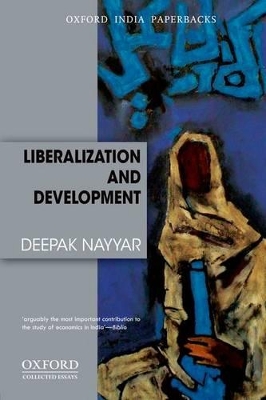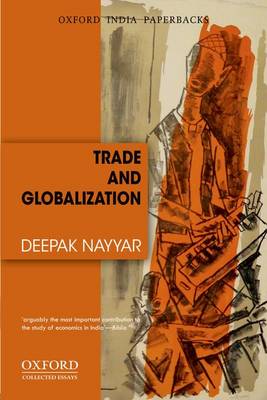Oxford India Paperbacks
2 total works
This collection of fifteen essays by eminent economist Deepak Nayyar provides an unusual blend of theory and policy, of applied research and empirical work, and of the world economy and India. It explores a wide range of themes-from macroeconomics and industrialization, to development in the changed context shaped by liberalization. This paperback edition includes a new Preface that focuses on developments since 2008 when the book was first published.
The essays in the volume are grouped in four thematic clusters. The first part is on economic theory contextualized in developing countries. It relates macroeconomic theory and policy to the institutional setting and explores alternative perspectives for developing countries. The second part is on development, in a world that has been transformed by markets and globalization. It analyses the implications of this transformation in retrospect and prospect. The third part is on industrialization.
It begins with the international context to consider the debate on industrialization in India which is relevant for other late-industrializers. The fourth part is on liberalization with a focus on India. It evaluates the Indian experience with stabilization, adjustment, and reform, which is then
situated in its wider political and historical context.
The essays in the volume are grouped in four thematic clusters. The first part is on economic theory contextualized in developing countries. It relates macroeconomic theory and policy to the institutional setting and explores alternative perspectives for developing countries. The second part is on development, in a world that has been transformed by markets and globalization. It analyses the implications of this transformation in retrospect and prospect. The third part is on industrialization.
It begins with the international context to consider the debate on industrialization in India which is relevant for other late-industrializers. The fourth part is on liberalization with a focus on India. It evaluates the Indian experience with stabilization, adjustment, and reform, which is then
situated in its wider political and historical context.
This collection of fifteen essays by eminent economist Deepak Nayyar provides an unusual blend of theory and policy, of applied research and empirical work, and of the world economy and India. The volume begins with the limited domain of trade theory and ends with the wide canvas of globalization. This paperback edition includes a new Preface that focuses on developments since 2008 when the book was first published.
The essays are grouped into four thematic clusters: economic theory, world trade, the Indian experience, and globalization and development. The first sets of essays consider issues that have been largely neglected in mainstream economics: free trade doctrine, trade in services, and international labour movements. The second part on world trade examines the much debated issues of transnational corporations, East-South trade, regional trade blocs, and the multilateral trading system. The third
part highlights the nature of changes in India's engagement with the world economy over six decades. The fourth part explores different aspects of globalization in the wider context of the world economy: historical experience, national development, international migration, and global governance.
The essays are grouped into four thematic clusters: economic theory, world trade, the Indian experience, and globalization and development. The first sets of essays consider issues that have been largely neglected in mainstream economics: free trade doctrine, trade in services, and international labour movements. The second part on world trade examines the much debated issues of transnational corporations, East-South trade, regional trade blocs, and the multilateral trading system. The third
part highlights the nature of changes in India's engagement with the world economy over six decades. The fourth part explores different aspects of globalization in the wider context of the world economy: historical experience, national development, international migration, and global governance.

